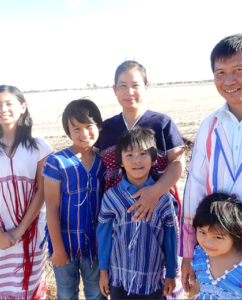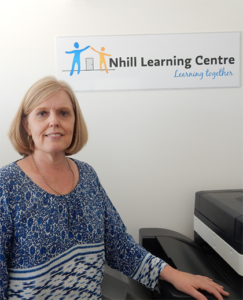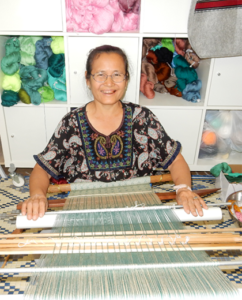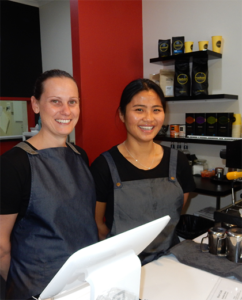Refugee settlement at Nhill – ten years on
It’s close to sundown and the birdsong reaches an end-of-day crescendo as a small group of people carrying hoes and rakes drift among the garden beds pushing and prodding as they tend the crops.
The tranquillity is palpable as the gardeners expertly pull out uninvited weeds – and harvest plump tomatoes and fiery chillies along with strange looking greens and gourd-like vegetables.
This is the community garden at Nhill, in western Victoria, where at the end of every day a group of Karen-Burmese refugees come to tend the plots where they grow traditional foodstuffs that cannot be had in the local IGA supermarket.
The quiet, lush garden on the edge of town is a long way from the teeming refugee camps of the Thai-Burma border where most of the Karen were born or spent decades of their lives.
The garden is part of an extraordinary initiative which has seen the Karen refugees resettle at Nhill, in Victoria’s Wimmera District.
The settlement program, which has just reached a ten-year milestone, was effectively begun by John Millington, OAM, who in 2009 was General Manager of local poultry processer Luv-a-Duck.
With a lack of local labour to facilitate the company’s expansion, Mr Millington turned to settlement agency AMES Australia to see whether there were any refugees willing to relocate to Nhill.
After arranging for a group of Karen to visit the Luv-a-Duck plant and Nhill, four workers were hired.
Nhill has since become a centre of resettlement for Karen people, who now make up about 10 per cent of the population, or around 240 people in all.
Most began their Australian lives in the Melbourne suburb of Werribee, before settling in the town from 2009.
Now there are more than 160 Karen working at the plant, on local farms and in local businesses.
“We learnt very quickly that it was important that the partners and kids of the workers were involved. We knew that they had to be looked after, engaged and connected to the community or the whole thing would fall over,” Mr Millington said.
“It was also important that the local established community was on board, so we made sure they understood what was happening,” he said.
Now, ten years on, the settlement of the Karen is bedded down and they are part of the fabric of Nhill’s community.
CEO of the Nhill Learning Centre Annette Creek, who also has been instrumental in supporting the settlement of the Karen, says it’s “not a big deal anymore”.
“We’ve got to the point where the Karen are part of our community and our town and it’s not a point of discussion,” she said.
“And that’s exactly what you want. It’s a really good symbol of how well the integration here has happened,” Ms Creek said.
Over the ten years, a generation of Karen children have grown up in the town. Apart from the way they look, they are indistinguishable from Australia-born kids in town.
Ms Creek says they are represented among the town’s Netball teams and other sports groups.
“At the school presentation night recently, there was an equal split among the award winners between Karen kids and local kids,” she said.
“Ten years ago in Nhill, the Karen community stood out – now we’re a true multicultural town.”
Although the effort to settle and integrate the Karen at Nhill has had its challenges, Ms Creek says it has been “absolutely worth it”.
She says the Karen are now significant contributors to the local community although the process to reach sustainable settlement was much harder than she imagined at the start.
“Really the success of this was built on the good will of people. At first a smallish group put their hands up to support the Karen but the wider community has also been prepared to embrace the newcomers,” she said.
Ms Creek says the whole experience has been personally rewarding.
“Every day, as I meet and connect with the Karen community, I’m always touched by their resilience and their ability to make a go of things here,” she said.
“If we can give them the opportunity to make new, fulfilling and sustainable live for themselves, why wouldn’t we?
“I love seeing them succeed and thrive. I enjoy seeing them achieve milestones like buying a house or getting a job they didn’t think they could do.
“It’s incredibly rewarding to know that you are making a difference in people’s lives,” Ms Creek says.
The settlement of the Karen has spawned some other interesting projects.
One of them is ‘Paw Po’, which means ‘little flower’ in Karen, a social enterprise that makes colourful and artistic products that combine contemporary design and creativity with traditional, loom-woven fabrics.
The business, which has a shop on Nhill’s main street, provides the opportunity for Karen and other women to develop and share skills, prepare for employment and connect with each other and the community at large.
It grew out of job ready classes at the learning centre being attended by Karen refugee women.
Ms Creek said Paw Po was part of the Learning Centre’s strategy to build skills in the area and especially empower women which saw it win the AMES Australia Diversity Innovation Award in the 2017 Victorian Learn Local Awards.
“It’s been great for the ladies and also good for the town. We really just followed the ladies’ lead as they wanted to do something with their own fabrics and we understood their desire to work with their fabrics,” she said.
One of Paw Po’s mainstays is Karen woman Asoe, a qualified seamstress who has started a clothing alteration business out of the shop.
Asoe came to Nhill two years ago from Bangkok and helps the other women make a range of dresses, bags, kids’ clothes, scarves and other fabric goods.
“I like it here. It’s quieter than Bangkok and there are opportunities here that Karen people in the camps cannot take,” she said.
Another project is Oliver’s Café, also in the main street, which has recently been taken over by the Learning Centre and offers the opportunity for Karen and other people to learn hospitality skills.
It currently employs two Karen women Bleh Benyo and Mura Htoo as well as several locals.
Ms Creek said taking over the café was an obvious thing to do.
“It’s a lot of work but the last thing this town needed was the closure of another business,” she said.
The settlement of the Karen has been vital for the town’s economic survival.
An economic impact study carried out by Deloitte Access Economics in 2015 found the resettlement program at Nhill had resulted in positive outcomes for the refugee families and added almost 100 jobs and more than $40 million to the local economy.
Over five years, 70.5 full time jobs were created, representing a three per cent increase in total employment across the district, and $41.5 million was added to the Gross Regional Product.
In the months following the completion of the report, another 27 jobs were created in and around Nhill.
The study, titled Small towns Big returns – Economic and social impact of the Karen resettlement in Nhill, found that like many other regional towns, Nhill faced a declining working-age population, the resultant loss of services and amenities and the flow-on implications for the economic and social prosperity of the town.
It found that a declining population in the town and a very low unemployment rate were key factors in the resettlement.
“In particular there was a need for labour to support expansion of Luv-a-Duck, the largest local business, and driven by a combination of economic and humanitarian motivations, Luv-a-Duck management identified the Karen as potential employees,” the report said.
“Through a staged recruitment and resettlement process, the Karen community now comprises approximately 10 per cent of the Nhill population, including significant numbers of working age adults and families with young children. Furthermore, labour force participation linked to this population increase is high,” it said.
The study also identified significant social outcomes stemming from the resettlement program, including: the arrest of population decline; revitalised local services and increased government funding; and, an increase in social capital across both communities.
John Millington says the positive economic and social outcomes have moved beyond the Deloitte report.
“What has happened here in Nhill with the arrival of the Karen has gone to another level and everyone is benefitting,” he said.
“There are new families arriving from the camps on the Thai-Burma border and we now have about 26 Karen home owners in town.
“Four Karen nurses are employed at the hospital and we have Karen employed in local businesses and farms.
“But just as importantly, the presence of the Karen has enriched the rest of us.” Mr Millington said.
The positive social impact of the Karen being here continues to be extraordinary.
“We are a small rural community that has embraced and opened its hearts and minds to the Karen,” Mr Millington said.
“This has enriched the community through exposure to another culture. It has made Nhill a better and more interesting place to live and it’s made us all better people,” he said.
“It never started out as a grand plan. It was just something that happened.
“It’s really grown into something very special and Marg (John’s wife) and I are really humbled by the success it has had.
“This was not just our doing. It was picked up by the whole community and everyone has benefitted.
“The Karen have found peace and happiness and a place to call home – and they’ve got safety and security almost for the first time in their lives.
“The community has benefitted in that the Karen’s presence has helped our community stay strong and build on the things that went before like sports and service clubs. And obviously businesses and the local economy has benefitted,” Mr Millington said.
Marg Millington says she is proud to have been part of the program.
“We’re proud to be part of a humanitarian mission that has had astounding outcomes in helping so many people and that belongs to our small township,” she said.
With regional settlement of migrants and refugees high on the federal government’s agenda and with many regional communities actively seeking to attract more migrants, there are important lessons that can be learned from the experience at Nhill.
Annette Creek says that early investment in settlement and integration could pay dividends in the long term.
“The big issue for us in the beginning was the lack of services, or funding for services. We relied heavily on volunteers and community support and that made it hard,” she said.
“There is so much grass roots work to be done in preparing for a migrant community to settle in a small town and I would advise communities to put their hands up early and say ‘we need help here’.
“It can be done but you do need to put your heart and soul into it. You need to think outside the square and be resourceful and look for ways to make things work.
“Every town is unique with a unique set of circumstances but you will always need the good will of the community to make things work.
“If communities – and even the nation as a whole – puts resources in and invests early, we can achieve sustainable success that can have a lasting impact into the future,” Ms Creek said.
One of the beneficiaries of the investment made at Nhill is Po Tha, a Karen who arrived in the town with his family just a week ago.
Po has moved from Toowoomba to take up a job at Luv a Duck. He said it was the sense of community and the welcome that attracted him.
“In Toowoomba there were not many Karen, there was no feeling of community for me,” Po says as he rakes a pile of compost in the community garden.
“I heard about Nhill and the Karen community here. So I came with my family,” he said.
“In just a week, we have made friends. My kids have made friends and I am volunteering to help in the garden.
“We feel at home here. We feel at peace. The people here – all of the people not just the Karen – are friendly and welcoming.
“I think my family will have a good life here,” Po said.
Laurie Nowell
AMES Australia Senior Journalist












